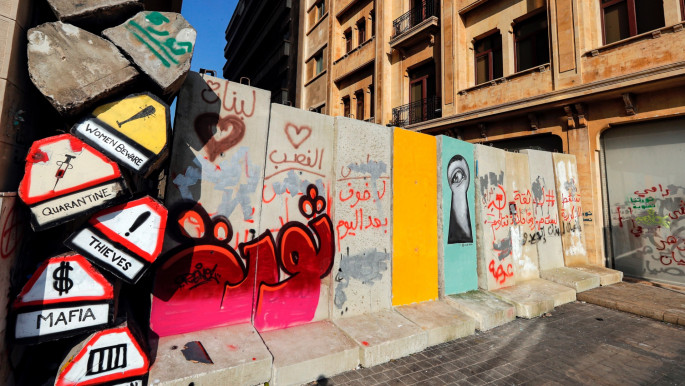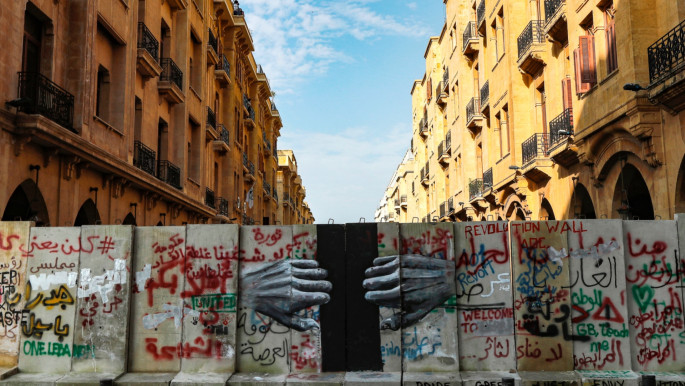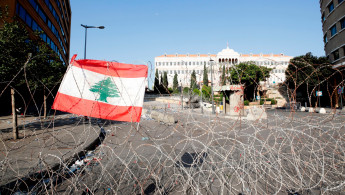'Anywhere is better': A new wave of emigration looms over Lebanon
A graduate in international business from a top university, and a qualified sound engineer, as an ambitious, multi-skilled man he was able to lead a comfortable life in Beirut.
But that was before late 2018. Then, Malaeb began to feel the effects of Lebanon's years-long economic recession as his work bonuses and incentives were cut, and he saw his purchasing power diminish in the face of soaring living costs.
Things have gone from bad to worse for him over the past year, with the local currency in freefall against the US dollar and inflation rapidly rising.
"Inflation has been snowballing, the exchange rate is crazy, prices are just f***ed, there's no electricity," he told The New Arab. "It's not acceptable to live here anymore".
Two months into Lebanon's protest movement last year, his salary was slashed by a quarter, then halved, as the Lebanese pound started depreciating. Recently, his monthly earnings have crashed by as much as 80 percent since the pound's value dropped on the black market.
 |
Troubles don't end in Lebanon. When a problem comes, there's another one next |
 |
"I'm working 12 hours a day in total and I'm making less than $500 [per month]. That's when you start thinking about leaving the country," the musician said. "We just live day by day," he added, noting that because of the unstable currency it is impossible to plan or know whether a business might stay open or close from one day to the next.
Karim Abdul Samad, an immigration consultant, says that well before mass anti-government protests hit the country last autumn many Lebanese, especially the youth, were considering moving abroad due to a lack of job opportunities. He himself is among those Lebanese who were thinking of emigrating before the October revolution.
 |
|
| Read more: Besides coronavirus, Lebanon has an equally dangerous outbreak on its hands - unemployment |
"Let's be honest, you have to either belong to a religious sect, be affiliated with some political party, or have good connections to live in this country," the consultant told The New Arab.
In the first quarter of last year, the financial crisis kicked in amid a severe slowdown in foreign currency injections in the national economy, where the Lebanese pound and the US dollar are used interchangeably in everyday life.
That resulted in black market rates emerging and banks imposing daily limits on dollar withdrawals even before nationwide demonstrations erupted in October 2019, barring account holders from transferring money abroad or withdrawing their US dollar funds.
Since then, the adverse exchange rate has dramatically worsened leading to hyperinflation and rising dollar scarcity, making essential goods less and less affordable for the wider population.
"Now it has become unbearable, people are hardly able to make ends meet. A lot of them have figured that they can't stay and build a future here," Samad stressed, alluding to fellow citizens aged between 22 and 50 years old. He estimated that 25 to 35 percent of Lebanese are currently making plans to move to another country.
The Covid-19 crisis that reached Lebanon in early March exacerbated the country's economic downfall. The pound has lost more than 80 percent of its value, plunging from the official rate of around 1,500 to above 8,000 to the dollar on the black market.
 |
It's very unstable here, all super expensive, I can't access my own money, I can't travel anywhere. We're not breathing. We feel like prisoners in our own country |  |
Hundreds of thousands of people are being left without work, an increasing number of businesses are closing permanently, employers are slashing wages, dollars are close to impossible to find, prices are skyrocketing, and there are shortages in basic commodities such as food, pharmaceuticals, and oil products, together with frequent and prolonged daily power cuts.
Samad stated that since the onset of Covid-19 there has been an upsurge in people wanting to migrate. Between June and the first half of July, he held up to 60 meetings with people inquiring about immigration options - half of whom now have their applications in progress. Last week alone he had 20 consultations.
Some people have an informed idea about where they want to migrate and why, while others have no specific destination in mind and need to be guided through the process based on their background and life goals. "A lot of them come to me like, 'I don't care where I'm going, just get me out of here'," the emigration specialist said, explaining that many have lost hope over the years in trying, time and again, to build a stable life in their homeland. Either way, those who choose to leave are ready to do whatever it takes to make it work.
In the past few years, Malaeb hoped in vain things would be okay in the near future. "Troubles don't end in Lebanon. When a problem comes, there's another one next and so on. It's a vicious circle, we're all sick of it," he said.
 |
|
| Read more: 'War is inevitable': Lebanon's lost generation grapples with a bleak future |
Worried about more political and economic unrest in the future, three months ago the 37-year old sensed that it was time to leave the country for good to find a "stable" and trouble-free country to settle in, instead of wasting the most active years of his working life.
Well educated and highly skilled, he wants to go somewhere where he will be treated fairly. After initially considering Canada and northern Europe, he finally opted for Australia and applied for immigration. He is prepared to undergo lengthy preparations in order to leave.
The emigration process takes 12 to 18 months on average, and requires careful research, securing immigration documents and gathering the required finances to prepare to move abroad, according to Samad, who strives to advise prospective migrants in the best possible way.
Sandra Khalil, a Lebanese woman aged 42, has never been satisfied with life in her home country, where she is long used to getting by juggling several jobs. A freelance copywriter and translator, she also went into life coaching recently, but that was not enough to cope with the exorbitant cost of living.
 |
Hundreds of thousands have been left without work, employers are slashing wages, dollars are close to impossible to find, and prices are skyrocketing |  |
Before the revolution things were not too bad for her, but everything has deteriorated since. Her pay in local currency now has little value, and she is struggling to manage with rising daily expenses while taking care of her ill father.
"It's very unstable here, all super expensive, I can't access my own money, I can't travel anywhere. We're not breathing," Khalil complained. "We feel like prisoners in our own country."
The versatile professional has felt for a while that her hard work is not valued, and knew she would leave. A few weeks ago, she made up her mind on going abroad, anywhere where she is able to emigrate. She is planning to start looking for jobs very soon, and at the same time starting to process her papers through the help of an immigration attorney.
 |
|
| Read more: Lebanon's uphill corruption battle against an 'untouchable class' |
"Everything is a hassle, even basic stuff. Why should I stay?" Khalil said. "I don't want to waste more time here, I'd rather redirect my energy where it's of good use".
As the country's only international airport partially reopened at the start of July, after a three-and-a-half-month closure due to Covid-19, a new wave of Lebanese citizens are planning their escape.
But not many can afford it. Even buying a plane ticket has become difficult, given that tickets are mainly priced in dollars. Besides that, savings are worth little in contrast to the financial assurances required by foreign embassies when Lebanese citizens apply for a visa.
Those who do not have the financial means but are desperate to leave may try whatever they can to raise the funds, either by borrowing from their relatives or friends, or selling valuable belongings.
Betrayed by the ruling elite and disillusioned, more Lebanese are growing hopeless and searching for an exit from their country as they feel they are left with no other choice.
"I started planning. Can't wait to settle somewhere else. And I don't think I'll consider visiting anymore, not even for a short vacation. I'm done," Nathalie J BanAge, a Lebanese marketing consultant, commented to a Facebook post titled "How many of you are seriously considering emigrating from Lebanon or already planning it?"
"At this point, anywhere is better, I am repulsed by the country," Rach April Bassili, a Lebanese artist, wrote in her comment. "It breaks my heart that I've reached this point after I held on/fought so much to make something worthy here. We don't have what it takes."
"Unfortunately, after all that time of resilience for the first time we found ourselves losing hope in this country. Now yes we are thinking seriously of continuing our life in a decent and peaceful country, where the human is respected and his rights are assured," another wrote.
Alessandra Bajec is a freelance journalist currently based in Tunis.
Follow her on Twitter: @AlessandraBajec



